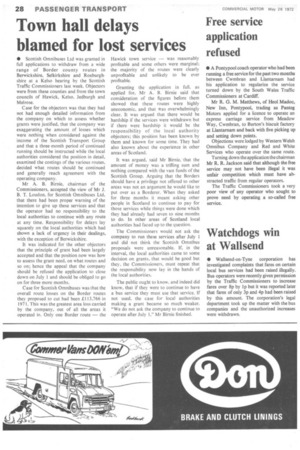Town hall delays blamed for lost services
Page 30

If you've noticed an error in this article please click here to report it so we can fix it.
• Scottish Omnibuses Ltd was granted in full applications to withdraw from a wide range of Border county routes in Berwickshire, Selkirkshire and Roxburghshire at a Kelso hearing by the Scottish Traffic Commissioners last week. Objectors were from these counties and from the town councils of Hawick, Kelso, Jedburgh and Melrose.
Case for the objectors was that they had not had enough detailed information from the company on which to assess whether grants were justified, that the company was exaggerating the amount of losses which were nothing when considered against the income of the Scottish Transport Group and that a three-month period of continued running should be instructed while the local authorities considered the position in detail, examined the castings of the various routes, decided what routes should be continued and generally reach agreement with the operating company.
Mr A. B. Birnie, chairman of the Commissioners, accepted the view of Mr J. B. T. Loudon. for Scottish Omnibuses Ltd, that there had been proper warning of the intention to give up these services and that the operator had no responsibility to the local authorities to continue with any route at any time. Responsibility for delays lay squarely on the local authorities which had shown a lack of urgency in their dealings, with the exception of Berwickshire.
It was indicated for the other objectors that the principle of grant had been largely accepted and that the position now was how to assess the grant need, on what routes and so on; hence the appeal that the company should be refused the application to close down on July 1 and should be obliged to go on for three more months.
Case for Scottish Omnibuses was that the overall route losses on the Border routes they proposed to cut had been £113,766 in 1971. This was the greatest area loss carried by the company, out of all the areas it operated in. Only one Border route — the Hawick town service — was reasonably profitable and some others were marginal; the majority of the routes were clearly unprofitable and unlikely to be ever profitable.
Granting the application in full. as applied for, Mr A. B. Birnie said that consideration of the figures before them showed that these routes were highly uneconomic, and that Was overwhelmingly clear. It was argued that there would be hardship if the services were withdrawn but if there were hardship it would be the responsibility of the local authority objectors; this position has been known by them and known for some time. They had also known about the experience in other areas of Scotland.
It was argued, said Mr Birnie, that the amount of money was a trifling sum and nothing compared with the vast funds of the Scottish Group. Arguing that the Borders should have a privilege not offered to other areas was not an argument he would like to put over as a Borderer. When they asked for three months it meant asking other people in Scotland to continue to pay for those services while things were done which they had already had seven to nine months to do. In other areas of Scotland local authorities had faced up to the question.
The Commissioners would not ask the company to run these services after July 1 and did not think the Scottish Omnibus proposals were unreasonable. If, in the interval, the local authorities came to some decision on grants, that would be good but they. the Commissioners, must repeat that the responsibility now lay in the hands of the local authorities.
The public ought to know, and indeed did know, that if they were to continue to have a bus service they must use that service. If not used, the case for local authorities making a grant became so much weaker. "We do not ask the company to continue to operate after July 1," Mr Birnie finished.




































































































